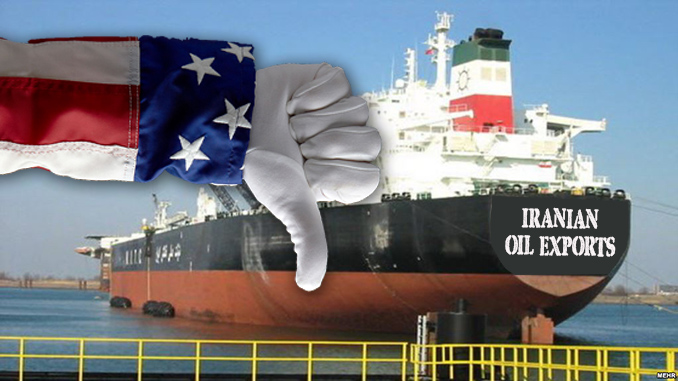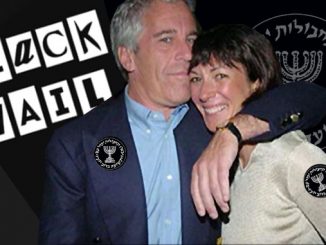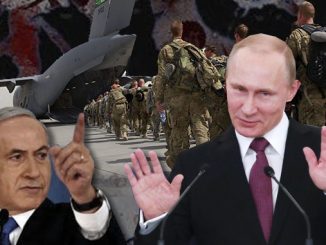
President Trump’s Israeli petroleum gambit imperils his re-election chances and invites war.
By Dr. Kevin Barrett
Has the White House gone insane? On April 21 The Washington Post reported that the Trump administration is ending its waivers exempting Iran’s biggest oil customers from Israeli- instigated U.S. sanctions.
Over a year ago the Trump administration, demonstrating its subservience to Israeli Prime Minister Benjamin Netanyahu, announced it would “drive Iran’s oil exports to zero.” That was supposed to have happened by the end of the first week of November 2018. But shortly before the “most biting sanctions ever imposed” were scheduled to come online, Trump exempted Iran’s leading oil customers. The list of nations that buy Iranian oil begins with China, India, and Korea, which together purchase almost half of the total output. Next are Turkey, Italy, and Japan. All six nations were exempted.
Why did Trump tear up his own sanctions last November? Because none of Iran’s customers were going to respect them. As Bloomberg reported on Aug. 2, China—by far Iran’s largest oil recipient—rejected Trump’s request to forego Iranian crude. Tehran’s second-biggest oil customer is India. In early October, one month before Iran’s oil trade was supposed to be driven “to zero,” India said it would ignore U.S. sanctions.
In July, even before China and India rebuffed Trump, Turkey had led the way in rejecting the Israeli-American plan to sanction Iran. Turkish Foreign Minister Mevlut Cavusoglu called the planned sanctions “inappropriate”—and was seconded by President Recep Erdogan, who made it clear that Turkey would continue purchasing Iranian oil.
Trump’s November 2018 decision to back off from the sanctions was wise. His April 2019 decision to reverse himself and try to enforce the unenforceable was a monumental blunder.
Will China, Iran’s biggest oil customer, obey Trump? Hardly.
“We think that China can’t and won’t back down this time, and we could easily see an increase of Chinese oil imports from Iran up towards maybe 1 million barrels per day,” said Bjarne Schieldrop, chief commodities analyst at SEB Group. “There will also be an increasing amount of oil exports out of Iran which will go ‘under the sanctions radar’. . . . It will drive Iran closer to China and enable China to settle yet more oil in renminbi.”
As China and other countries thumb their noses at the U.S., it is American prestige and credibility—not Iranian oil exports—that will be driven to zero. And as the world finds ways to trade outside of U.S. dollars, the U.S. dollar will be driven, if not to zero, at least toward a valuation closer to that of toilet paper than gold.
But even though everyone expects near-universal noncompliance with the sanctions, oil prices are soaring. Why is that? If Iran will keep selling its oil, maybe even in larger amounts, shouldn’t oil prices remain stable or decline? The answer is that sanctions, no matter how toothless, signal hostility, increase the odds of trade wars or even shooting wars, and spook the futures markets. If there is even a 20% probability of a huge trade war, and a 5% probability of a major U.S. attack on Iran, which Iran would respond to by shutting down the Persian Gulf, the oil futures markets turn bullish as high-rollers gamble on the long-shot possibility that oil prices might shoot through the roof.
Once it becomes clear that nobody is respecting the sanctions and American consumers find themselves paying higher energy prices in a stagnating economy, Trump will face a tough choice: either back off once again, thereby shredding what little credibility the U.S. may still have, or double down by “enforcing” the sanctions, thereby eliciting a tit-for-tat response from China, India, and Iran’s other customers. That’s a recipe for an all-out trade war that would cripple economies around the globe just in time to ruin Trump’s re-election chances in 2020.
The real architect of U.S. anti-Iran sanctions is Netanyahu, though. The Israeli prime minister is gambling that Trump will be forced into a corner and will have no choice but to start a shooting war with Iran—a war that would likely be set off by yet another Israeli false flag. Such a war would be disastrous for the U.S. Like the Iraq war it would help destroy the Middle East in service to Israeli expansionism, while sapping America’s blood, treasure, and prestige.
Trump probably doesn’t understand how he is being played. He has so much to think about that he doesn’t have time to analyze such issues in depth. Instead, he relies on advice from his financial backers—casino magnate Sheldon Adelson, the Kushner family, and the rest of the Kosher Nostra—and their hired guns—Secretary of State Mike Pompeo and National Security Advisor John Bolton.
By listening to people who hope to benefit from another disastrous Middle Eastern war, Trump is dooming his own presidency—and leading his country toward the abyss.
Kevin Barrett, Ph.D., is an Arabist-Islamologist scholar and one of America’s best-known critics of the War on Terror. From 1991 through 2006, Dr. Barrett taught at colleges and universities in San Francisco, Paris, and Wisconsin. In 2006, however, he was attacked by Republican state legislators who called for him to be fired from his job at the University of Wisconsin-Madison due to his political opinions.
Related, from American Free Press Issue 17 & 18:
Israeli Prime Minister Dictating American Foreign Policy on Iran
By Richard Walker
Washington’s policy of pleasing Israel has continued unabated with a State Department decision to sanction Iran’s Revolutionary Guard Corps by declaring it a terrorist organization.
It was an unprecedented move, representing the first time the U.S. applied a foreign terrorist organization tag to another country’s army. The decision was not considered a wise one by some senior U.S. military figures. It was opposed by Russia, China, and many of America’s NATO allies, especially Turkey. It may well complicate and place at risk American forces in the region after Iran retaliated by branding the U.S. Central Command a terrorist group, similar to ISIS.
The State Department announcement was applauded by Secretary of State Mike Pompeo and other hawks, including National Security Adviser John Bolton. It had the characteristics of yet another gift to Israeli Prime Minister Benjamin Netanyahu, coming as it did at the time of his re-election victory. It also followed a recent decision by President Donald Trump to approve Israel’s illegal occupation of the Golan Heights, which is rightfully Syrian territory according to international law.
While this latest move was clearly designed to satisfy Israeli demands by piling even more sanctions on Iran, it stood in stark contrast to Washington’s diplomatic love affair with North Korea, a nuclear state that poses a significant risk to South Korea and the large U.S. military contingent stationed there.
Turkish President Recep Erdogan, who has been a vocal critic of Israel’s interference in the affairs of the Middle East, condemned the U.S., saying it risked destabilizing the region. It is not the first time he has taken issue with Washington’s Middle East interventions. In 2018, Erdogan described U.S. sanctions against Iran as illegal, a position supported by the UN, and made it clear he would not abide by them.
Turkey happens to be a major trading partner with Iran and imports a lot of its oil. It is likely Erdogan will not recognize the latest Washington penalties, nor will Russia, China, and the EU, all of which have been opposed to Washington’s increasing determination to punish Iran since Trump took office. Most European nations believe the developing U.S. strategy was demanded by Netanyahu and the warmongers in his cabinet that favor a war with Iran. Some experts have hinted that the anti-Iran posture of the State Department was the outcome of a secret pact between Trump son-in-law Jared Kushner and his close friend, Saudi leader Mohammed bin Salman.
Sanctions against Iran have never proved effective and have only hurt the Iranian people, whom Washington claims to care about it. They have become deeply resentful of a U.S. policy that risks conflict, seeing it as one influenced directly by Washington neocons linked to Tel Aviv.
George Galloway, a former British parliamentarian for 30 years, described the State Department’s decision as a “dangerous escalation” that will further sour relations between the Trump White House and our allies, especially in Europe.
“It is the equivalent of declaring the U.S. Marine Corps a terrorist organization, though with much less justification given that Iran hasn’t invaded another country for centuries. Washington’s description of Iran as ‘expansionist’ is enough to make a horse laugh given the worldwide projection of U.S. bases and military hardware around the world—and around Iran,” Galloway added.
The bottom line is that Iran does not pose an existential threat to the United States or to a nuclear- armed Israel, which has one of the most formidable arsenals in the world. Instead, it has a young, vibrant population that most surveys have shown would like better relations with America. That cannot happen while Netanyahu uses Iran as a political punching bag and the Saudis promote anti-Iran sentiment through lobbyists who purchase support in Congress. Sanctions do not hurt the Iranian military. The latest ones will embolden religious hardliners in Tehran and in the upper ranks of the Revolutionary Guard Corps.
For those of us who have watched Trump try to fulfill his campaign promises to withdraw America from Middle East conflicts, it is puzzling that he keeps being dragged back into the region by allies, especially the Saudis and the Israelis. It should be clear to him that a war with Iran is something both those allies in particular would like, but it would be disastrous for the region and for America. It could create a firestorm across the Middle East and drag in Russia, which is an Iran ally.
Trump has handed off a lot of Middle East policymaking to Kushner, a family friend of Netanyahu and bin Salman. The Saudi-Israel nexus has also been promoted by neocons from both parties in Congress and especially by National Security Advisor John Bolton. It may be time for Trump to seize the reins of Mideast policymaking and talk personally and directly with Iran, as he has done with the North Korean leader Kim Jong Un.
Richard Walker is the pen name of a former N.Y. news producer.







